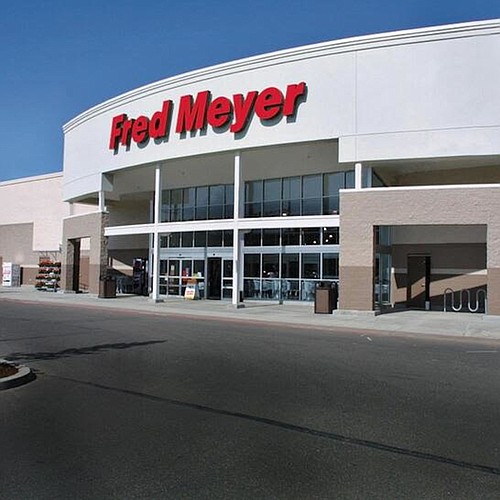- December 13, 2025
-
-
Loading

Loading

Benderson Development Co. is best known along the Gulf Coast for ground-up developments and distressed property upgrades, but since late 2019 the University Park company also has grown its nationwide portfolio through a series of transactions exceeding $1.5 billion.
Most recently, the company announced earlier this month that it had acquired 28 Fred Meyer superstores in Oregon, Washington, Idaho and Alaska. The estimated $500 million deal also will add 4.5 million square feet to Benderson’s portfolio.
“The Pacific Northwest has always been one of our top areas of interest to grow our national footprint,” says Benderson President Randy Benderson, in a statement.
“Fred Meyer is a leader in these markets, and we’re very pleased to strengthen and enhance our long-term partnership with them.”
The sale-leaseback investment brings to 32 the number of Fred Meyer Stores Inc. outlets Benderson now owns. It also raises its overall portfolio to more than 800 properties totaling 45 million square feet in 40 states.
Fred Meyer operates 132 stores in total, which average 165,000 square feet — larger than most Costco Wholesale Club outlets or SuperTarget stores. In buying the portfolio, Benderson outbid roughly 20 other qualified buyers.
In all, Benderson — one of North America’s largest privately held real estate companies — has completed a half-dozen other acquisitions over the past 18 months.
They include a $218 million purchase of the land beneath Pioneer Natural Resources’ 10-story, roughly $1 billion corporate headquarters in Irving, Texas; a $130 million leaseback acquisition of Thrivent Financial’s new corporate headquarters in Minneapolis, Minnesota, an eight-story, 264,139-square-foot building; and an equity stake in the land beneath Duke Energy Corp.’s new Charlotte Metro Tower in North Carolina, a 40-story skyscraper with 1 million square feet.
Benderson has also acquired ground leases under New York City’s 300-room Hampton Inn Manhattan/Times Square Central; the nine-story, 206-room Highland Dallas hotel; and the 17-story, 525-unit Willard Towers apartments in Chevy Chase, Maryland, a tony suburb of Washington, D.C., the company says in a statement.
Benderson officials could not be reached for comment regarding their recent investments.
In the case of Fred Meyer, parent Kroger Co. will commit to new 25-year leases with Benderson, the base rent for which is $25 million annually for the 28 locations. Under terms of the “absolute net lease” deal, Portland-based Fred Meyer and Kroger will cover all operating expenses associated with the stores.
Additionally, the leases contain 5% rent increases every five years, so that by 2046 Fred Meyer will pay Benderson roughly $32 million annually, says Jose Carrazana, a broker who helped negotiate the sale leaseback, in a statement.
“These stores are best-of-the-best, investment-grade tenancy, and Fred Meyer has strong sales,” says Patrick Toomey, an executive director with Institutional Property Advisors (IPA), a division of commercial real estate brokerage Marcus & Millichap, who together with Carrazana and several others at the firm negotiated on behalf of Kroger and Fred Meyer.
Fifteen of the Fred Meyer stores that were part of the transaction are located in Oregon, while another 10 are in Washington state.
Benderson didn’t purchase the stores alone, however.
As was the case in both the Thrivent and Duke Energy deals, Benderson worked with Timonium, Maryland-based CGA Capital, which specializes in net-lease financing and acquisitions and has closed more than $20 billion worth of deals since its formation in 2009 by executives from RBS Securities and formerly Legg Mason Inc., of Baltimore.
W. Kyle Gore, a CGA Capital co-founder and managing director, says in an email that his firm was “also involved in the Fred Meyer effort,” but he declined further comment.
Companies like Thrivent, Pioneer Natural and Kroger are attracted to net-lease real estate deals because they allow them to redeploy capital for operations or other expansions.
“In today’s economic environment, sale-leasebacks provide growing companies with a highly efficient capital solution, so this was a prudent financial decision for us at Thrivent,” Vibhu Sharma, the company’s CFO, says in a statement.
For Benderson and other investors, conversely, net-lease transactions provide long-term stable cash flow and credit-tenant guarantees.
Pioneer Natural, under terms of its lease with Benderson, for instance, will occupy its 1.12 million-square-foot headquarters through at least 2040.
IPA’s Toomey agrees that interest in sale-leaseback deals is only likely to proliferate as the U.S. economy continues to rebound from the COVID-19 pandemic.
“The market for these types of transactions is alive and well, especially for grocery-anchored properties in good locations, as these are,” he says.
“They’re very much in demand now, and they’re a bellwether of the overall commercial real estate market in a way, in that they reveal the level of pent-up demand there is among investors for high-quality real estate. And in this case, Benderson performed flawlessly.”